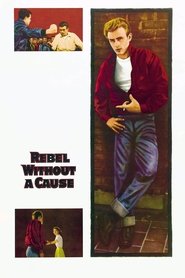If you didn't know the fate of James Dean, it would be almost impossible to fathom why this film has the reputation it has.
I mean, given that Dean is often compared with Marlon Brando, I was expecting an oblique screenplay to rival A Streetcar Named Desire (1951). But what I got instead was something about as un-enigmatic as the protagonists themselves. Whilst the film tries to frame them as misunderstood 'yoof', I was genuinely siding with the poor adults who, for the most part, seem to be sincerely trying to connect and help their (post-WW2) children.
Perhaps it was more of a document of—and at—the time and so watching this today means I can't truly appreciate the atmosphere of the 1950s that this film would be making an implicit comment on. Still, despite The Catcher in the Rye coming out in serialised form in the years before this film was released, it would be difficult to make a convincing case that the very concept of the undirected rebel was novel to the 1950s. And even the particular aesthetics of this particular rebellion can be seen elsewhere. And later too, as well: at the very least, we'd see the same leather-jacketed goons a half-decade in West Side Story (1961), but there they have the grace to understand that they are symbolic members of a greater corps de ballet, rather than actual characters that we decide whether we care about or not…
There are a few interesting moments. In his review on Slant Magazine, Dan Callahan astutely observes that:
When Plato is shot, [the director] has Jim and Judy in the frame with him and he tilts the camera with the impact of the bullet; it’s one of the most devastating shots in film history because it visually annihilates the rapport the three teenagers have built up in an instant.
But, yes, a bit of a disappointment for me, all things considered. I could certainly have done without the film and all its characters grossly patronising the obviously homosexual character Plato, which stretches all the way mocking his mismatched socks, giving him a totally homo and effeminate moped (in place of a manly car), and reaches his zenith by completely denying he was ever attracted to Jim in the first place. What did they think he was doing all this shooting for, for goodness sake? And speaking of half-cocked Freudian psychology, I forgot that the film strongly implies that it was Plato's lack of a father figure (and having a Black 'mammy' straight out of Gone With the Wind…) that turned him gay in the first place. Who knew!
The whole movie just failed to tear me apart, in other words.
Synopsis: After moving to a new town, troublemaking teen Jim Stark is supposed to have a clean slate, although being the new kid in town brings its own problems. While searching for some stability, Stark forms a bond with a disturbed classmate, Plato, and falls for local girl Judy. However, Judy is the girlfriend of neighborhood tough, Buzz. When Buzz violently confronts Jim and challenges him to a drag race, the new kid's real troubles begin.

